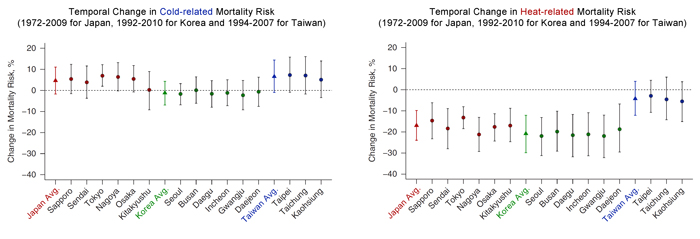| Follow @co2science |
Paper Reviewed
Chung, Y., Noh, H., Honda, Y., Hashizume, M., Bell, M.L., Guo, Y-L. L. and Kim, H. 2017. Temporal changes in mortality related to extreme temperatures for 15 cities in northeast Asia: Adaptation to heat and maladaptation to cold. American Journal of Epidemiology 185: 907-913.
Writing as background for their study, Chung et al. (2017) say that "understanding how the temperature-mortality association worldwide changes over time is crucial to addressing questions of human adaptation under climate change." And as their contribution to the subject, they set out to investigate the temporal change in this relationship for fifteen cities in three countries from Northeast Asia (Japan, Korea and Taiwan) over the past four decades, during which time temperatures increased in all cities.
In accomplishing their objective, Chung et al. utilized a generalized linear model with splines, which method allowed them to investigate a nonlinear association between temperature and mortality, as well as a nonlinear change in this association over time. Additionally, their analysis was stratified by cause-specific mortality (from cardiovascular, respiratory and non-cardiorespiratory) and age group (under age 65, 65-75 years and greater than 75 years of age).
Results of their analysis revealed that cold-related mortality risk remained relatively constant over time (see the left panel of Figure 1 below), with only one of the fifteen locations exhibiting a trend that was statistically significant. In contrast, all of the study locations revealed declines in heat-related mortality (weighted average of approximately -16% change), only three of which declines were not statistically significant (Figure 1, right panel). Chung et al. also report that the temporal pattern of decreasing heat-related mortality differed by age and cause of death, where the oldest segment of the population and respiratory-caused deaths experienced the largest decreases.
Chung et al.'s findings dispel two climate-alarmist claims - that global warming will enhance heat-related deaths and that the elderly population will suffer the most. In direct contradiction of these assertions, the results of this new study clearly demonstrate that (1) populations are adapting to heat-related deaths, as evidenced by declining trends in mortality risk over time, and (2) the elderly are not suffering a disproportionate number of heat-related deaths. Whereas trends in heat-related deaths were higher in the older populations at the beginning of the records, they have disproportionately declined and "converged to become similar among the three age groups in later years."
How could climate alarmists have gotten things so wrong!

Figure 1. Temporal change in city-specific and country-specific cold- and heat-related mortality risk over the study period in each country (1972-2009 for Japan, 1992-2010 for Korea, and 1994-2007 for Taiwan). Circles and triangles represent city-specific and country-specific central estimates of risk change with bars indicating 95% posterior intervals. Adapted from Chung et al. (2017).




